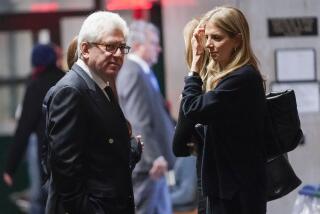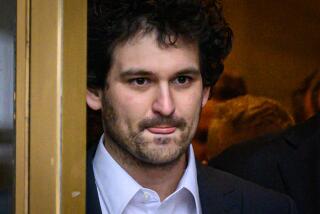Prosecution: Enron Execs Self-Serving
- Share via
HOUSTON — As closing arguments began Monday in the trial of former Enron Corp. chieftains Kenneth L. Lay and Jeffrey K. Skilling, a prosecutor described the defendants as arrogant and self-serving executives who acted as if they alone owned the company they had helped to build.
But in fact, Assistant U.S. Atty. Kathryn H. Ruemmler told the jury, it was thousands of Enron employees and other shareholders who owned the energy company and were entitled to honesty and fair treatment from Lay and Skilling -- not the “outright lies” and accounting “trickery” the government alleges they got.
Of the ordinary shareholders, including three who testified during the 15-week trial, Ruemmler said: “It was their Enron. It wasn’t Mr. Lay’s Enron. It wasn’t Mr. Skilling’s Enron.”
Lay, 64, faces six counts of conspiracy and fraud. Skilling, 52, faces 28 counts of conspiracy, fraud and insider trading. They are accused of lying to the public and conspiring with subordinates to falsely inflate profit and hide losses at Enron, which went from being a Wall Street darling to the subject of what was, in late 2001, the largest bankruptcy filing in U.S. history. Each could be sentenced to more than 20 years in prison if convicted of all counts.
Lay and Skilling have denied any wrongdoing. Their lawyers are scheduled to present their allotted six hours of closing arguments today. The government will follow Wednesday with two hours of rebuttal by prosecutor Sean M. Berkowitz. The jury is expected to begin its deliberations later that day.
The ninth-floor courtroom was at near capacity of about 100 spectators, including news reporters, family members and friends of the defendants, lawyers involved in Enron matters and curious onlookers. The fourth-floor “overflow room,” where the proceedings are broadcast via closed-circuit television, was also at near capacity, perhaps as crowded as it has been since the trial started.
In a presentation lasting almost four hours, Ruemmler hammered home the central tenets of the government’s case -- that Lay and Skilling knew Enron was a financial house of cards and that they lied to keep alive the cover story that the company was thriving.
She said the defendants’ overriding motive was to keep Enron’s stock -- the source of their huge personal fortunes -- riding high by making sure that the company’s reported earnings kept pace with the expectations of Wall Street analysts.
At one point early on, Ruemmler unveiled an easel with a large poster headlined “Ken Lay’s Philosophy.” Beneath was an excerpt from Lay’s testimony under cross-examination two weeks ago: “Rules are important but you shouldn’t be a slave to the rules.”
As the only two chief executives in Enron history, Lay and Skilling “had their hands firmly on the wheel,” Ruemmler said. “They set the tone. They created the culture.”
In mid-August 2001, when Skilling abruptly resigned for unspecified “personal reasons,” Enron was beset by accounting problems, faltering new businesses and overvalued international assets -- “the chickens were coming home to roost,” as Ruemmler put it. At that time, when Lay and Skilling publicly announced the latter’s resignation, she said they faced the choice of whether to make a clean breast of Enron’s troubles.
Instead, she said, they chose to lie, portraying the company as in the best financial shape in its history.
Meanwhile, she said, Lay was in the midst of unloading $20 million worth of Enron stock back to the company between mid-August and early September, selling in such a way that he wouldn’t have to disclose the sales until the following year. And Skilling would sell $15 million of his stock a little later, on Sept. 17.
Ruemmler also branded as “absurd” the defense’s contention that the only wrongdoing at Enron was the thievery secretly committed by former Chief Financial Officer Andrew S. Fastow and a small number of associates.
She asked jurors to compare the words and the remorseful demeanors of the half a dozen witnesses who admitted to participating in the years-long fraud with those of the two defendants. Lay and Skilling, she said, used ridicule and condescension -- along with convenient memory lapses -- as they clung to stories that made no sense.
Ruemmler, 35, soft-spoken, stood about five feet in front of the jury box as she delivered her argument, now and then walking a few steps to a rostrum to consult her notes.
Lay looked on frowning from behind her. Skilling, sometimes chewing on a pen, sometimes making notes with it, also watched Ruemmler closely.
Ruemmler’s closing argument followed U.S. District Judge Sim Lake’s 90-minute reading of carefully honed but dense legal instructions to the South Texas federal jury of eight women and four men.
At lunchtime, a group of about a dozen supporters of frequent presidential candidate Lyndon H. LaRouche Jr. serenaded the defendants and others exiting the courthouse with a surprisingly tuneful song mocking Enron’s downfall.
More to Read
Inside the business of entertainment
The Wide Shot brings you news, analysis and insights on everything from streaming wars to production — and what it all means for the future.
You may occasionally receive promotional content from the Los Angeles Times.










